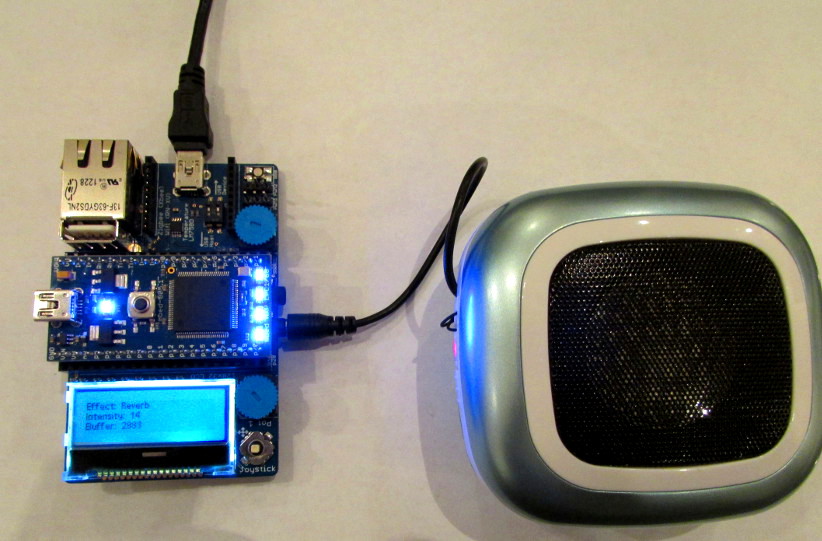Streams USB audio with sound effects applied. Sound effect selected by joystick and intensity altered by tilting the mbed. Output to the mbed-application-board phono jack.
Dependencies: C12832_lcd MMA7660 USBDevice mbed

/* Uses the mbed LPC1768 and mbed-application-board to create a USB audio device * that streams audio from a host computer to headphones or powered speakers. * A couple different sound effects can be applied to the stream in real-time, * and tilting the mbed alters intensity of the effect. * * ECHO * The joystick selects ) | * one of three effect ) STRAIGHT - o - STRAIGHT * modes. ) | * REVERB * * * * \\ || * Tilting the mbed ) ====== \\ || * determines intensity ) \\ || * of the effect. ) * 0% 50% 100% * * The LCD display shows the current effect mode, intesity and buffer level. */
delay.cpp
- Committer:
- bw
- Date:
- 2014-03-27
- Revision:
- 2:9429f84ea165
- Parent:
- 0:bbf6cf0eab95
File content as of revision 2:9429f84ea165:
/*******************************************************************************
* Implements delay lines for audio samples.
* Bryan Wade
* 27 MAR 2014
******************************************************************************/
#include "delay.h"
#include "string.h"
struct delay_t { // Implementation of opaque type.
int16_t *base;
int16_t *head;
size_t len;
};
/*
* Create a delay object given a ptr and size of available RAM.
* This is only allocating memory for the metadata. The location of
* the buffer memory is passed in.
* @return Ptr to the new delay.
*/
delay_t *Delay_Create(void)
{
return (delay_t *)malloc(sizeof(delay_t));
}
/*
* Configure delay buffer location and size.
* @return True if successful.
*/
bool Delay_Configure(delay_t *delay, void *ram, size_t size)
{
if (delay) {
delay->base = delay->head = (int16_t *)ram;
delay->len = size / sizeof(int16_t);
memset(ram, 0, size);
return true;
}
return false;
}
/*
* Push a new sample with feedback into the delay while simulateously retieving the output sample.
* @return Output data.
*/
int16_t Delay_WriteWithFeedback(delay_t *delay, int16_t dataIn, uint16_t gain)
{
int16_t dataOut = *delay->head;
// Feedback gain is fixed-point Q16 format.
*delay->head = dataIn + ((gain * dataOut ) >> 16);
if (++delay->head >= delay->base + delay->len)
delay->head = delay->base;
return dataOut;
}